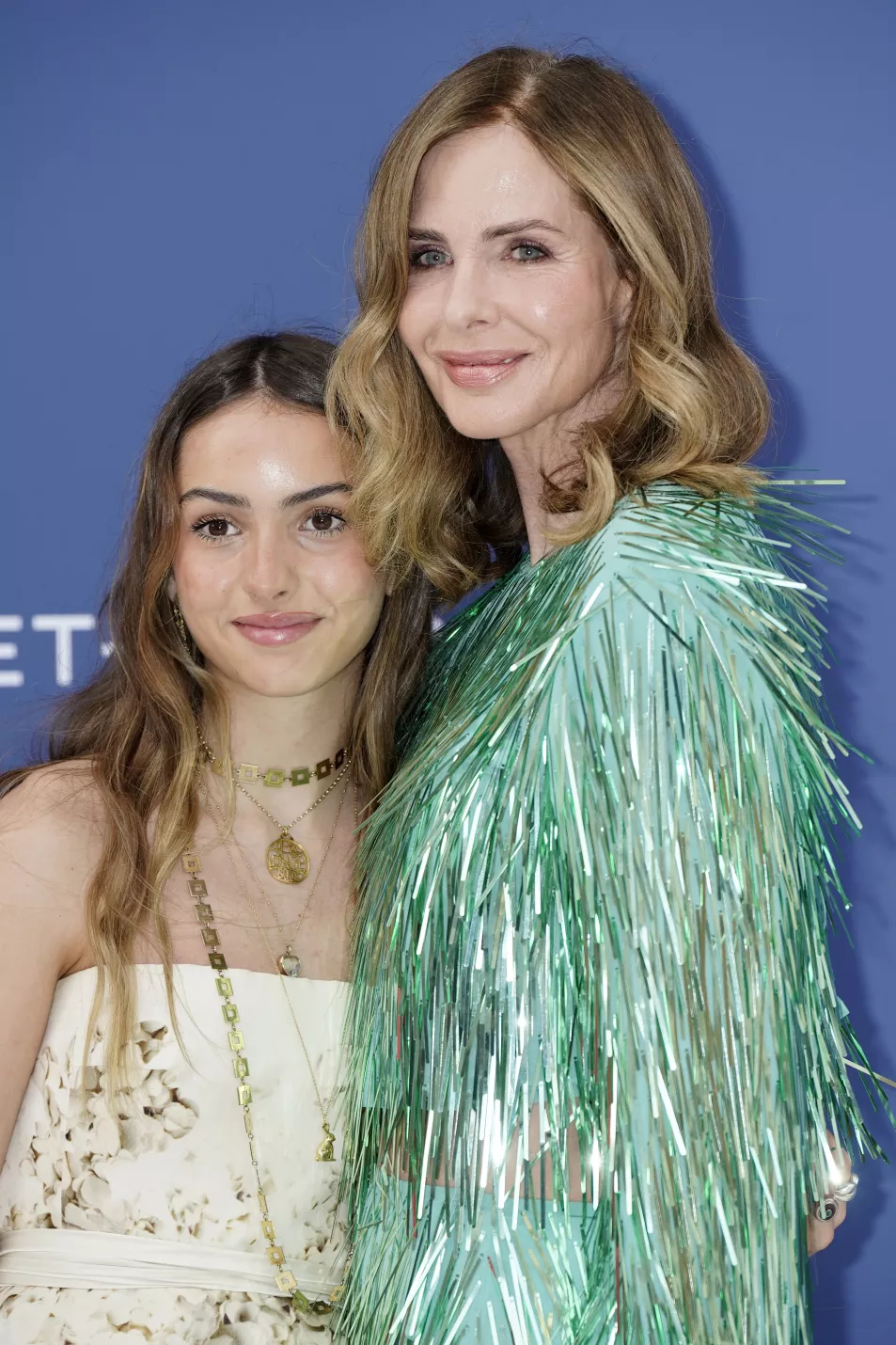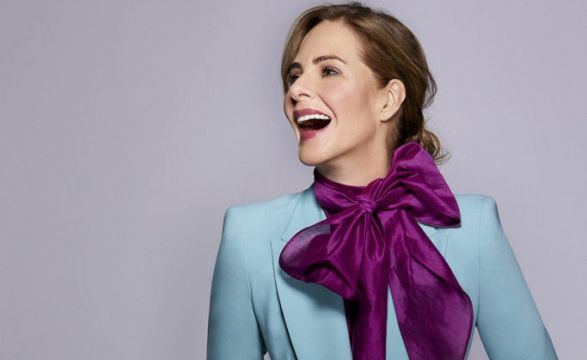Overcoming drug addiction in her 20s was a “tough life lesson” that left TV style guru and entrepreneur Trinny Woodall feeling “raw”. But ultimately, the experience enabled her to build a life where she was no longer “running on quicksand”.
As Woodall – who rose to fame alongside Susannah Constantine fronting the BBC’s seminal styling series What Not To Wear in the early-Noughties – recalls: “I’ve had many life lessons that made me look at myself differently. When I realised I couldn’t use drugs and I had to stop, that was a tough life lesson. And I thought I could never stop – I was so scared I could never stop.
“But I did. And the strength it took to stop brought with it a whole load more fear,” adds the 59-year-old, who had two stints in rehab in her early and mid-20s. “Because when you stop using a substance [and] end up in rehab, they sort of peel back the layers of an onion, and you’re left feeling that everything that’s been a band-aid which you put on that onion, has been removed. And you’re like – ‘but I have no support here’, and feel very raw and wobbly.
“You then build it up with things that aren’t a band-aid. You strip yourself back, so that what you build up again feels like it’s got concrete on the bottom, and you’re not running on quicksand.”
AdvertisementView this post on Instagram
Those concrete foundations have brought her a long way. Today, six months shy of her 60th birthday, Woodall is in full flow.
There’s her burgeoning make-up and skincare brand Trinny London, which she founded in 2017, reportedly clocking sales of £23.7 million for 2021/22. And she has just published her most personal book yet – Fearless – a guide to life, style and beauty.
It weaves insights from her own sometimes rocky, often remarkable, and endlessly relatable path – spanning feeling like an insecure ‘outsider’ in her 20s, finding purpose in her 30s, to IVF, loss, solo parenting and the newfound freedom of her 50s, alongside snippets of self-help guidance.
Topics like self-worth, confidence and intuition are mixed in with steps on finding your ideal colour palette and curating outfits. For Woodall, these are all part of the picture of living fearlessly – and while Fearless encompasses everything she has learned along the way, she does not expect all of it to resonate.
“There is no one route to having a life which takes away elements of fear,” she says today. “But there are lots of things we could be fearful about, so I listed all the things I’ve had fear around in my life, and how I dealt with it.”
View this post on Instagram
Advertisement
Born in London as the youngest of six siblings (three of whom were from her banker father’s first marriage), Woodall attended boarding school from age six, spending much of her childhood abroad as her parents travelled. She recounts in the book feeling like she ‘didn’t fit in’ after returning to London as a young adult – and how she ‘started taking drugs to overcome my lack of self-belief’.
When she finally got sober, “four of my closest friends died within a year”, she adds now. “There are many reasons people don’t go back to using drugs, but that – for me – was a very big wake-up call.”
She is quick to answer when asked what brings her the most joy in life today: “Seeing my daughter happy… And I can’t wait for her to feel the joy of growing up.”
The book is dedicated to Lyla – “my inspiration” – the daughter Woodall shared with her ex-husband, drummer and businessman Johnny Elichaoff (she is also stepmother to his son Zak, 30). Five years after they divorced, Elichaoff died from suicide in 2014, after reportedly struggling with long-term painkiller addiction and financial difficulties.

Woodall is just back from dropping Lyla, now 19, off at university in Spain when we speak over Zoom. “I put tons of sticky notes around her room and by her bed, saying, ‘Get up and get moving’. We’ve already had about nine phone calls so far,” she reveals, explaining that her daughter’s a bit anxious – “like anyone who’s going to another city would be”.
She agrees there have been big shifts in how we approach emotional support in our culture, compared with previous generations.
“There was never that feeling of ‘let me try and understand what you’re going through’. There was the empathy of, ‘I’m sure you’ll feel better’, but there wasn’t that, ‘let me let you go through it’.
“Sometimes we have to let somebody go through something, instead of always wanting to come with a solution.”
Fear still crops up for Woodall these days, of course. And while she admits she’s felt bouts of imposter syndrome over the years, she doesn’t like the phrase. “I think it’s derogatory, because so many people do feel it, and I don’t want people walking around thinking ‘I’m an imposter’, because they’re not an imposter.
“They’ve highlighted something where they don’t feel their most confident – so what can they do to change that feeling? That’s what I feel the conversation should be about.

“Turning up as CEO [for Trinny London], I’d never been a CEO before – I could easily say I suffer from imposter syndrome being a CEO to 220 people,” she continues. “But I know I have a knowledge that is unique, that is the reason I am CEO. And I know I hired people who are really much better at their job of product development, of digital marketing, of operations, much better and much more experienced than I am. But I am CEO because it’s my idea, I have unique insight, I understand our customer and who we’re selling to.
“I need to remember that some days more than others. Some days I feel full of that knowledge. And other days, I wake up and think ‘I’ve got to own my CEO-ness today’.”
Does she hope embarking on a new career chapter in her 50s will inspire others?
“There wasn’t a sense of, ‘I must do this before I’m too old’. Age for me just never comes into it – other people bring age into the conversation. I just think, what’s the next thing?”
Is she good at switching off?
“It’s a tough one, I can be good, and I can be terrible… No, I can’t really switch off,” she says with a laugh.
Writing Fearless was a helpful nudge for her own self-care too, she admits. “Because I know lots of good advice for people, but we don’t always practice what we preach, do we? When I was going over the book, re-editing and re-editing, it did make me really aware of, ‘oh, I do that less now, I do that a bit more – let’s get the balance back’.”
She meditates daily, and credits her morning routine for keeping her grounded and on track.
“On a good self-care day, I wake up, I don’t look at my phone – I don’t go straight into that rabbit hole of emails or scrolling. I go into a [meditation] app, lie in bed and do that. That’s so small, but so helpful. Then I get up and do some form of movement – Pilates, strength training or yoga – and I do that five days a week.
“I can’t afford not to, for my mental and physical state, they’re both very equal,” Woodall reflects. “Because I want to feel strong in myself.”

Fearless by Trinny Woodall is published by HQ, HarperCollins. Available now.







